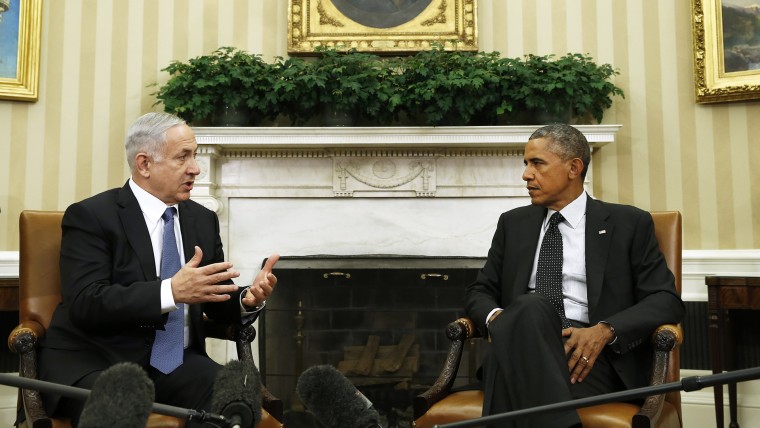When Israeli Prime Minister Benjamin Netanyahu resisted the Middle East peace process, his relationship with President Obama's White House suffered. When Netanyahu
took subtle steps to support Mitt Romney's campaign, the ties strained further.
When Netanyahu forged a partnership with congressional Republicans to undermine American foreign policy, things got worse. When Netanyahu announced he'll stand in the way of a two-state solution, things got even worse. When Netanyahu used racially charged rhetoric to boost far-right voter turnout in Israel, things got even worse, still.
Is there anything else the Israeli prime minister can do to undermine his relationship with the American president? This
front-page piece in the
Wall Street Journal may very well mark a new low.
Soon after the U.S. and other major powers entered negotiations last year to curtail Iran's nuclear program, senior White House officials learned Israel was spying on the closed-door talks. The spying operation was part of a broader campaign by Israeli Prime Minister Benjamin Netanyahu's government to penetrate the negotiations and then help build a case against the emerging terms of the deal, current and former U.S. officials said. In addition to eavesdropping, Israel acquired information from confidential U.S. briefings, informants and diplomatic contacts in Europe, the officials said.
To be sure, international espionage, even involving allies, is hardly unprecedented. There have been rumors for years about Israeli intelligence operating on American soil, and as the WSJ article noted, U.S. officials "have largely tolerated Israeli snooping." Since Americans also spy on Israel, it's all become quite routine.
What's more, Israel is not a party to the P5+1 talks, but it's extremely interested in the details of the negotiations, so it doesn't come as too big of a surprise that Israeli officials would go to great lengths to learn more about what's said behind closed doors.
But the article makes clear the White House is less angry about the spying and more upset about Israeli sharing inside information with Republicans and others in the hopes of derailing the sensitive nuclear talks.
A senior U.S. official told the Wall Street Journal, "It is one thing for the U.S. and Israel to spy on each other. It is another thing for Israel to steal U.S. secrets and play them back to U.S. legislators to undermine U.S. diplomacy."
For its part, Israeli officials deny the allegations raised in the WSJ report. Obama administration officials are reportedly taking the allegations quite seriously and have reason to be skeptical about the Israeli denials: the White House appears to have uncovered the scheme "when U.S. intelligence agencies spying on Israel intercepted communications among Israeli officials that carried details the U.S. believed could have come only from access to the confidential talks."
Given all of this, it's nothing short of amazing that among Republicans, it's widely assumed that President Obama is responsible for the tensions between the United States and Israel. For many GOP lawmakers in Capitol Hill, the fact that Obama hasn't endorsed Netanyahu's antics, and replaced American foreign policy with Israel's wishes, is clear evidence that the White House is wrong.
Fortunately, there are still some Republicans left inside the Beltway who
understand the basics of American foreign policy.
It's not just Democrats and White House officials who've got problems with Benjamin Netanyahu. Blasting "diplomatic missteps and political gamesmanship," former Secretary of State James Baker laid in hard to the Israeli prime minister on Monday evening, criticizing him for an insufficient commitment to peace and an absolutist opposition to the Iran nuclear talks.
As for the White House, Chief of Staff Denis McDonough told J Street's annual conference yesterday that the president sees no reason to let Netanyahu off the hook in light of the prime minister's repeated missteps.
Politico reported:
[Netanyahu's dismissal of a two-state solution], as well as Netanyahu's suggestion also made in the closing days before last week's Israeli elections that he'd approved settlements in contested territory in Jerusalem for the strategic purpose of changing the borders are "so very troubling," McDonough added that the White House isn't impressed by Netanyahu's efforts since last Tuesday to backtrack on what he meant when he said there wouldn't be a Palestinian state established so long as he's prime minister. "We cannot simply pretend that these comments were never made," McDonough said.
Perhaps even more provocative was the fact that the White House chief of staff said Israel risked "further isolation" by moving away from two-state solution. McDonough added, "An occupation that has lasted more than 50 years must end."
In a political context, Republicans seem to be operating from a specific principle: Netanyahu can do no wrong, and there's no need for consequences when American allies show disrespect and operate in bad faith towards the United States. The White House is relying on a very different set of principles.
